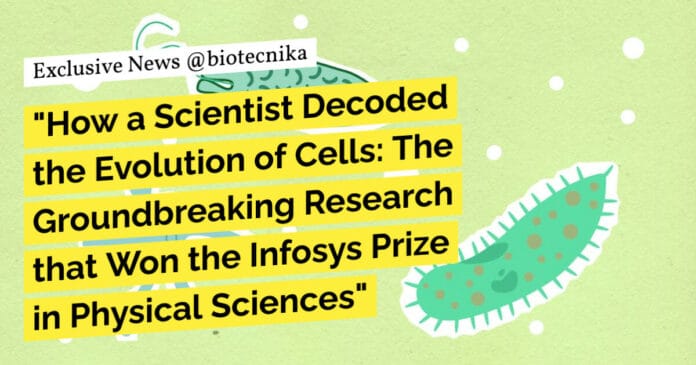
Meet Mukund Thattai: Reconstructing History of Cells to Decode Evolution’: NCBS Professor Wins Infosys Prize in Physical Sciences
Dr. Mukund Thattai, a professor at the National Centre for Biological Sciences (NCBS), has been awarded the Infosys Prize 2023 in Physical Sciences for his exceptional work in understanding the emergence of complex cells. Dr. Thattai has seamlessly combined the disciplines of cell biology, evolution, physics, and computer science to shed light on the history and functioning of cells. His contributions include investigating the evolution of eukaryotes from prokaryotic ancestors, studying the origin of key eukaryotic traits such as mitochondria and the vesicle trafficking system, and exploring the evolution and function of the Golgi apparatus.
Understanding the Emergence of Complex Cells
To unravel the mystery of how complex cells came into existence, Dr. Mukund Thattai employs a multi-disciplinary approach known as evolutionary cell biology. One method involves reconstructing the history of cells by analyzing genomes. By examining the genomes of eukaryotes, statistical methods can be used to trace back in time and infer the types of molecules and proteins these cells encoded. However, simply knowing the protein sequence is not enough to understand how the cell functions. Therefore, Dr. Mukund Thattai employs
models and techniques from physics and computer science to create dynamical models of cells. These models provide insights into the physical configuration of the cell. Specifically, he focuses on the membrane traffic system, which involves the movement of vesicles between different organelles within the cell. These vesicles transport cargo from one organelle to another, and understanding the complex network of molecular interactions and processes involved is crucial in deciphering cell dynamics.
Applications of Dr. Thattai’s Work
Dr. Mukund Thattai’s research not only addresses fundamental questions concerning the origins of life and cellular complexity but also has practical applications. One notable application lies in studying membrane traffic systems, as viruses exploit this system to replicate and spread. Additionally, the increasing volume of biological data necessitates the incorporation of evolutionary frameworks to extract meaningful insights. By integrating evolution into their work, researchers can derive valuable information from biological data, leading to advancements in various fields.
The Background and Context of Dr. Thattai’s Work
Although trained as a physicist, Dr. Thattai’s work goes beyond traditional disciplinary boundaries. The National Centre for Biological Sciences embodies the interdisciplinary nature of modern biology, employing a wide range of experimental methods and cutting-edge data analysis techniques. When it comes to the origin of cells, significant leaps occurred at different stages. The first leap involved the transition from pre-cellular life to cells capable of storing genetic material, which led to the emergence of prokaryotic cells (bacteria and archaea). The next significant development took place around 1.5 billion years ago when eukaryotic cells emerged, marking a shift towards larger and more complex cellular architecture. Dr. Thattai’s work concentrates on understanding the transition from simple prokaryotic cells to elaborate eukaryotic cells.
The Role of Science and Science Communication in Society
Dr. Mukund Thattai emphasizes the crucial role of science and science communication in society. While science and its advancements have become more influential than ever, there is also a growing skepticism towards scientific claims. It is understandable for the general public to question the basis of scientific facts, as these facts shape their everyday decisions. To prevent misrepresentations of science and the potential negative consequences for society, scientists must bridge the gap between their work and the public. Explaining the uncertainty inherent in scientific research is key to fostering understanding and informed decision-making. Scientists have an important role to play in engaging in conversations about science and addressing the uncertainties that underlie their work.
Conclusion
Dr. Mukund Thattai’s groundbreaking research on understanding the history and functioning of cells has earned him the prestigious Infosys Prize in Physical Sciences. By combining insights from cell biology, evolution, physics, and computer science, Dr. Thattai has made significant contributions to our understanding of the emergence of complex cells. His work has practical applications in studying membrane traffic systems and utilizing evolutionary frameworks to extract meaningful information from biological data. Science and science communication play vital roles in society, and scientists must actively engage in conversations about their work to bridge the gap between scientific knowledge and the public.
SEO Keywords: Dr. Mukund Thattai, Infosys Prize, physical sciences, complex cells, cell biology, evolution, physics, computer science, eukaryotes, prokaryotes, membrane traffic system, vesicles, organelles, scientific research, science communication.
- SEO Powered Content & PR Distribution. Get Amplified Today.
- PlatoData.Network Vertical Generative Ai. Empower Yourself. Access Here.
- PlatoAiStream. Web3 Intelligence. Knowledge Amplified. Access Here.
- PlatoESG. Carbon, CleanTech, Energy, Environment, Solar, Waste Management. Access Here.
- PlatoHealth. Biotech and Clinical Trials Intelligence. Access Here.
- Source: https://www.biotecnika.org/2024/01/mukund-thattai-how-a-scientist-decoded-the-evolution-of-cells-the-groundbreaking-research-that-won-the-infosys-prize-in-physical-sciences/

